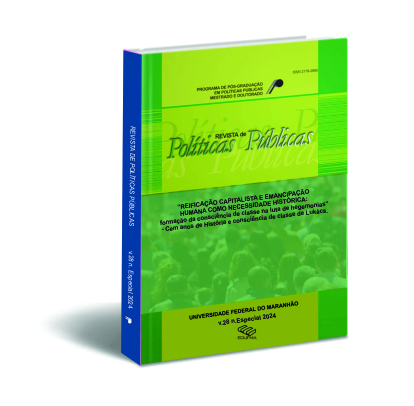COLONIALISMO, RACISMO E A LUTA PELA EMANCIPAÇÃO HUMANA: raça, classe e gênero no enfrentamento ao capital
DOI:
https://doi.org/10.18764/2178-2865v28nEp.2024.19Palavras-chave:
Racismo, política de promoção da igualdade racial, formação social capitalista, emancipação humanaResumo
O racismo é uma práxis econômica, social, cultural e política, originada no contexto da expansão do capitalismo comercial no século XVI, para justificar a exploração e opressão contra os povos africanos e indígenas, bem como os seus descentes, visando explorar força de trabalho e extrair riqueza para o colonizador. Esse tipo de exploração do trabalho produziu riquezas e proporcionou a acumulação de capital necessária para que o capitalismo se tornasse hegemônico tanto como o modo de produção econômico quanto um modelo civilizacional baseado em diversas formas de discriminação e hierarquização da diferença. O sistema do capital utiliza-se das diferenças entre os seres humanos para impor seus privilégios econômicos, sociais, políticos e culturais, retirando a mais-valia, por um lado, e, por outro, ampliando as desigualdades entre os próprios membros da classe trabalhadora, em especial, mulheres, negros, latinos, indígenas, LGBTQIA+. Dessa forma, vencer o racismo, as diversas formas de opressão e a discriminação, bem como construir a emancipação humana só será possível enfrentando e destruindo o capitalismo, unindo a classe trabalhadora em torno de interesses comuns. Eis um dos grandes desafios para a Emancipação Humana. No Brasil, raça e racismo são essenciais em nossa formação social capitalista, demarcando hierarquias sociais e raciais e uma mentalidade eurocêntrica. A classe trabalhadora negra, na luta contra o racismo e o movimento negro, na exigência por “igualdade racial”, exigiram dos governos a implementação de políticas centralizadas no recorte racial que resolvessem a questão negra. Este artigo, portanto, pautado pela análise qualitativa, bibliográfica e documental, fundamentado no materialismo histórico-dialético, propõe debater essa temática tão desafiadora na contemporaneidade, abordando temas relativos às políticas de igualdade racial, bem como as condições socioeconômicas das mulheres negras, a partir da perspectiva do materialismo histórico. Nesse sentido, este texto analisa alguns pressupostos da política de promoção da “igualdade racial” e suas possibilidades de garantir ou não a igualdade de raça. Destaca-se como o racismo tem relação estruturante com o modo de produção capitalista e avaliam-se as discussões, ações e contradições das propostas das entidades do movimento negro. Por fim, discutimos as práticas políticas necessárias para a conquista da emancipação humana e igualdade social.
Downloads
Downloads
Publicado
Como Citar
Edição
Seção
Licença

Este trabalho está licenciado sob uma licença Creative Commons Attribution-NonCommercial-NoDerivatives 4.0 International License.
UNIVERSIDADE FEDERAL DO MARANHÃO
PROGRAMA DE PÓS-GRADUAÇÃO EM POLÍTICAS PÚBLICAS
REVISTA DE POLÍTICAS PÚBLICAS
Termo de Transferência de Direitos Autorais
Como condição para a submissão, os autores devem declarar a autoria do trabalho e concordar com o Termo de Cessão de Direitos Autorais, marcando a caixa de seleção após a leitura das cláusulas)
- Declaro que participei da elaboração do trabalho referido, em parte ou no todo; que não omiti qualquer ligação ou acordo de financiamento entre os autores e instituições ou empresas que possam ter interesses na publicação desse trabalho;
- Declaro tratar-se de texto original, isento de compilação, em parte ou na íntegra, de minha autoria ou de outro (os) autor (es);
- Declaro que o texto não foi enviado a outra revista (impressa ou eletrônica) e não o será enquanto a possibilidade de sua publicação esteja sendo considerada pela RPP;
- Declaro que transfiro os direitos autorais do trabalho especificado para a RPP, comprometendo-me a não reproduzir o texto, total ou parcialmente, em qualquer meio de divulgação, impresso ou eletrônico, sem prévia autorização dessa Revista.
- Declaro que tenho conhecimento que a cessão do texto à RPP é gratuita e, portanto, não haverá qualquer tipo de remuneração pela sua utilização.

Este obra está licenciado com uma Licença Creative Commons Atribuição-NãoComercial-SemDerivações 4.0 Internacional.







